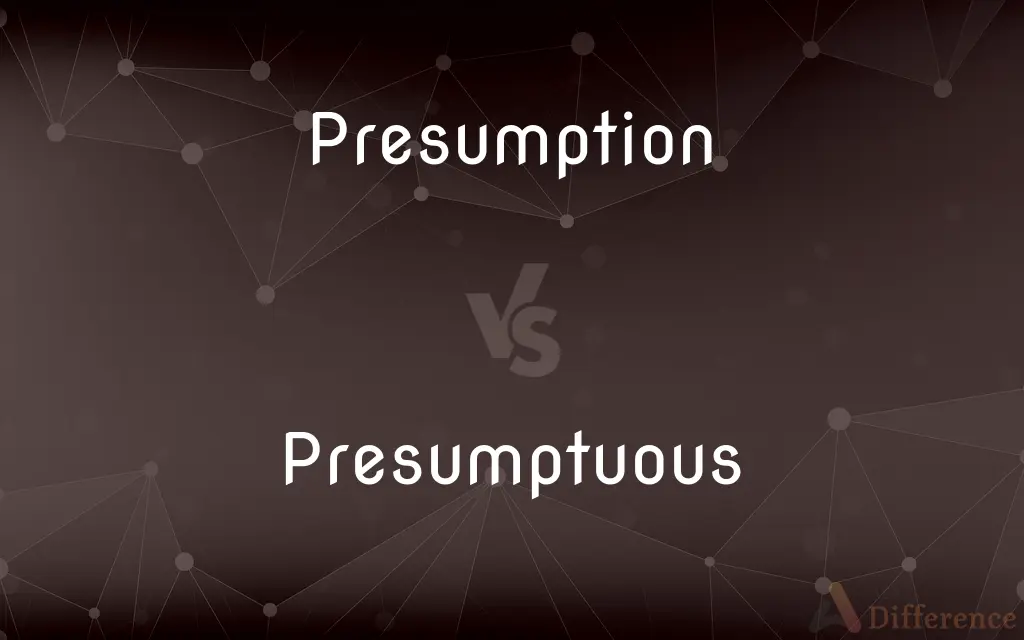Presumption vs. Presumptuous — What's the Difference?
By Fiza Rafique & Maham Liaqat — Updated on March 25, 2024
Presumption involves assuming something to be true, while presumptuous behavior is acting without respect for others or boundaries.

Difference Between Presumption and Presumptuous
Table of Contents
ADVERTISEMENT
Key Differences
Presumption often refers to believing something before it is proven, based on probability or reasoning. This can be a necessary step in many decision-making processes, where complete information is not available. Presumptuous, on the other hand, describes an attitude or behavior that oversteps social boundaries, often due to overconfidence or arrogance.
For instance, a detective might work on the presumption of a suspect's guilt based on circumstantial evidence before gathering conclusive proof. A presumptuous person might make decisions for others without their consent, assuming they know best. This can lead to discomfort or conflict, as it disregards the feelings and autonomy of others.
While presumption can be a neutral or even positive trait, depending on its application in contexts such as law, science, and everyday judgment, being presumptuous is generally viewed negatively. This distinction highlights the importance of context and intention in evaluating these behaviors. For example, in a courtroom, a presumption of innocence until proven guilty is a fundamental principle, whereas presumptuous behavior from a lawyer might undermine their credibility.
Presumption allows for the construction of hypotheses and theories in many fields, driving forward inquiry and discovery. It's a foundational aspect of the scientific method, where presumptions are tested against evidence. Conversely, presumptuous actions in a scientific context might involve ignoring data or consensus in favor of one's own unverified beliefs or hypotheses.
In social interactions, presumption can sometimes lead to misunderstandings when one assumes knowledge they do not possess, while presumptuous behavior can strain relationships. For instance, assuming someone's feelings without asking can be presumptive, whereas acting on those assumptions without permission is presumptuous.
ADVERTISEMENT
Comparison Chart
Definition
An assumption made before having evidence
Overstepping bounds due to arrogance or entitlement
Contexts
Legal, scientific, everyday judgment
Social interactions, decision-making
Connotations
Neutral or positive, depending on use
Generally negative
Impact
Drives inquiry and decision-making
Can strain relationships and cause conflict
Example
Presuming innocence in court
Making decisions for others without their consent
Compare with Definitions
Presumption
The act of believing something is true without proof.
His presumption of innocence was later confirmed by evidence.
Presumptuous
Making decisions for others without their input.
His presumptuous move to cancel the meeting upset the team.
Presumption
A legal principle that assumes a fact is true until proven otherwise.
The presumption against extraterritoriality limits the laws' reach.
Presumptuous
Overstepping appropriate bounds due to arrogance.
It was presumptuous of him to order for everyone at the table.
Presumption
An attitude of confidence in one's own reasoning.
Her presumption about the market trends was accurate.
Presumptuous
Acting without permission or right.
Her presumptuous use of the office resources was frowned upon.
Presumption
Boldness in making assumptions.
His presumption in taking the lead was appreciated in the crisis.
Presumptuous
Showing an undue sense of entitlement.
The presumptuous demand for special treatment irked her colleagues.
Presumption
A premise assumed in argument or belief.
The scientist's presumption was that all elements behave similarly under pressure.
Presumptuous
Assuming too much in a self-important manner.
The artist's presumptuous dismissal of criticism was off-putting.
Presumption
Behaviour perceived as arrogant, disrespectful, and transgressing the limits of what is permitted or appropriate
He lifted her off the ground, and she was enraged at his presumption
Presumptuous
(of a person or their behaviour) failing to observe the limits of what is permitted or appropriate
I hope I won't be considered presumptuous if I offer some advice
Presumption
In the law of evidence, a presumption of a particular fact can be made without the aid of proof in some situations. The invocation of a presumption shifts the burden of proof from one party to the opposing party in a court trial.
Presumptuous
Going beyond what is right or proper; excessively forward
Felt it was presumptuous of him to assume they had become friends.
Presumption
An idea that is taken to be true on the basis of probability
Underlying presumptions about human nature
Presumptuous
Going beyond what is right, proper, or appropriate because of an excess of self-confidence or arrogance.
Presumption
Behavior or attitude that is boldly arrogant or offensive; effrontery
She was offended at the stranger's presumption in speaking in such an casual manner.
Presumptuous
Full of presumption; presuming; overconfident or venturesome; audacious; rash; taking liberties unduly; arrogant; insolent; as, a presumptuous commander; presumptuous conduct.
A class of presumptuous men, whom age has not made cautious, nor adversity wise.
Presumption
The act of presuming or accepting something as true
The presumption of innocence of the accused.
Presumptuous
Founded on presumption; as, a presumptuous idea.
Presumption
A condition or basis for accepting or presuming something.
Presumptuous
Done with hold design, rash confidence, or in violation of known duty; willful.
Presumption
(Law) A conclusion applied by law as to the correctness of some fact, ordinarily subject to rebuttal by contrary evidence.
Presumptuous
Excessively forward;
An assumptive person
On a subject like this it would be too assuming for me to decide
The duchess would not put up with presumptuous servants
Presumption
The act of presuming, or something presumed
Presumption
The belief of something based upon reasonable evidence, or upon something known to be true
The presumption is that an event has taken place.
Presumption
The condition upon which something is presumed
Presumption
(dated) arrogant behaviour; the act of venturing beyond due bounds of reverence or respect
Presumption
(legal) An inference that a trier of fact is either permitted or required to draw under certain factual circumstances (as prescribed by statute or case law) unless the party against whom the inference is drawn is able to rebut it with admissible, competent evidence.
Presumption
The act of presuming, or believing upon probable evidence; the act of assuming or taking for granted; belief upon incomplete proof.
Presumption
Ground for presuming; evidence probable, but not conclusive; strong probability; reasonable supposition; as, the presumption is that an event has taken place.
Presumption
That which is presumed or assumed; that which is supposed or believed to be real or true, on evidence that is probable but not conclusive.
Presumption
The act of venturing beyond due beyond due bounds; an overstepping of the bounds of reverence, respect, or courtesy; forward, overconfident, or arrogant opinion or conduct; presumptuousness; arrogance; effrontery.
Thy son I killed for his presumption.
I had the presumption to dedicate to you a very unfinished piece.
Presumption
An assumption that is taken for granted
Presumption
(law) an inference of the truth of a fact from other facts proved or admitted or judicially noticed
Presumption
Audacious (even arrogant) behavior that you have no right to;
He despised them for their presumptuousness
Presumption
A kind of discourtesy in the form of an act of presuming;
His presumption was intolerable
Common Curiosities
Why is being presumptuous considered negative?
Being presumptuous is considered negative because it disregards others' feelings, autonomy, and social boundaries, often leading to conflict or discomfort.
Can a person be both presumptive and presumptuous?
Yes, a person can be both presumptive in their assumptions and presumptuous in their actions if they both assume things without evidence and overstep boundaries in an entitled manner.
What is the difference between presumption and presumptuous?
Presumption is an assumption made without proof, while presumptuous behavior involves overstepping boundaries due to arrogance or entitlement.
Can presumption ever be positive?
Yes, presumption can be a positive trait when it involves constructive assumptions made in contexts like science or law, driving forward inquiry and decision-making.
How does societal perception of presumptuous behavior vary?
Societal perception of presumptuous behavior can vary based on cultural norms and values, but it is generally viewed negatively as it involves disrespecting others' rights or boundaries.
Is presumption necessary for decision-making?
Presumption is often necessary for decision-making, especially in situations where complete information is unavailable, allowing for judgments based on probability or reasoned assumptions.
How does presumption function in a legal context?
In legal contexts, presumption is a principle that assumes a fact to be true until proven otherwise, such as the presumption of innocence.
What role does presumption play in scientific research?
In scientific research, presumption allows for the formulation of hypotheses and theories that can then be tested against evidence, driving discovery and understanding.
Are there any positive aspects of being presumptuous?
Generally, being presumptuous is viewed negatively, though confidence and initiative, when balanced with respect for others, can be positive traits.
How can presumptuous behavior affect relationships?
Presumptuous behavior can strain relationships by causing feelings of resentment or disrespect, as it involves making decisions for others without their consent.
How does one correct presumptuous behavior?
Correcting presumptuous behavior involves self-awareness, listening to feedback, respecting others' boundaries, and making amends for overstepping.
How does culture influence perceptions of presumption and presumptuousness?
Culture significantly influences perceptions of both presumption and presumptuousness, as cultural norms dictate what is considered appropriate behavior and the degree of autonomy or collectivism valued.
Can presumption lead to misunderstandings?
Yes, presumption can lead to misunderstandings when assumptions are made without sufficient evidence or understanding of a situation.
How should one handle presumptuous individuals in social situations?
Handling presumptuous individuals often involves setting clear boundaries, communicating openly about one's feelings, and sometimes distancing oneself if the behavior continues.
Is it always easy to distinguish between presumption and presumptuous behavior?
Distinguishing between presumption and presumptuous behavior can sometimes be challenging, as it depends on context, intent, and the perception of those involved.
Share Your Discovery

Previous Comparison
Tortie vs. Calico
Next Comparison
Dynamicity vs. StaticityAuthor Spotlight
Written by
Fiza RafiqueFiza Rafique is a skilled content writer at AskDifference.com, where she meticulously refines and enhances written pieces. Drawing from her vast editorial expertise, Fiza ensures clarity, accuracy, and precision in every article. Passionate about language, she continually seeks to elevate the quality of content for readers worldwide.
Co-written by
Maham Liaqat













































